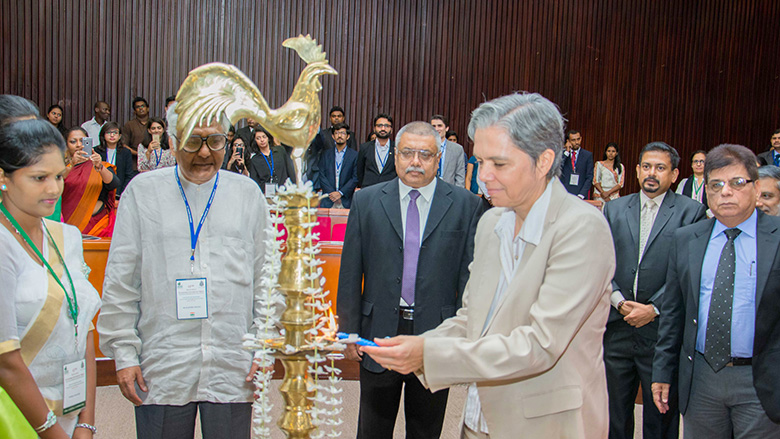“South Asia is a region with immense potential and youthful energy awaiting to thrive in the Asian Century. South Asia is also the least integrated region in the world. While trade and investment integration is limited, there is considerable population integration and South Asia features the largest flows of bilateral remittances between developing countries in the world,” said Françoise Clottes, the World Bank Group (WBG) Country Director for Sri Lanka and the Maldives. “Building trust among neighbors lays the foundation for lasting relationships that will benefit growth, poverty reduction and prosperity in the future,”
The agenda of SAESM Colombo includes oral presentations spanning across six subtopics under its overall theme, each based on the participant’s essay submitted during his or her application for SAESM, a quiz on economics awarding the country team with best knowledge and team work, as well as a ‘budding economist competition’ that picks the brightest young economist through both a writing and an oral test. Hosted by the Department of Economics, University of Colombo, this year’s participants come from a variety of South Asian universities including Dhaka University (Bangladesh), Delhi University (India), Lahore University of Management Sciences (Pakistan), University of Kabul (Afghanistan), Royal Thimphu College (Bhutan), and Tribhuvan University (Nepal).
”SAESM provides a platform for us from different universities across South Asia to network, share knowledge, and foster a collective understanding in issues of and formulate strategies for a South Asian economic development and prosperity,” said Umesh Moramudali, third year Economics student in the University of Colombo.
Recognizing its unparalleled efforts in facilitating regional academic and cultural exchange, the WBG has supported SAESM since 2012, in forms of financing, logistical support, external communications and keynote speeches.
“Regional Integration in South Asia is a work in progress, but recent developments in many of the countries provide cause for optimism. Most of the gains from regional integration remain under-exploited. To help realize some of these gains, the WBG is supporting country governments in South Asia to deepen cooperation with their neighbors in several areas including energy, trade and investment, and connectivity. Gains are likely to be incremental because this is a complex and long-term agenda. Youth can bring a business-like, uncluttered approach to provide greater momentum to the process of creating One South Asia,” said Sanjay Kathuria, Lead Economist, WBG Trade and Competitiveness Global Practice during the closing ceremony.
Since SAESM was piloted in New Delhi, India in 2004 by a group of university professors, it has been hosted rotationally by organizers in India, Bangladesh, Nepal, Pakistan, Sri Lanka, and Bhutan. Afghanistan sent its first batch of delegates in 2014.
“When we started SAESM, our objective was to bring together brilliant young economists from across South Asia and engage them in intensive academic exchange. Over the years SAESM has itself ‘graduated’ numerous dazzling talents and sent them worldwide,” said Sirimal Abeyratne, SAESM co-founder and chief organizer of Colombo SAESM 2016.

